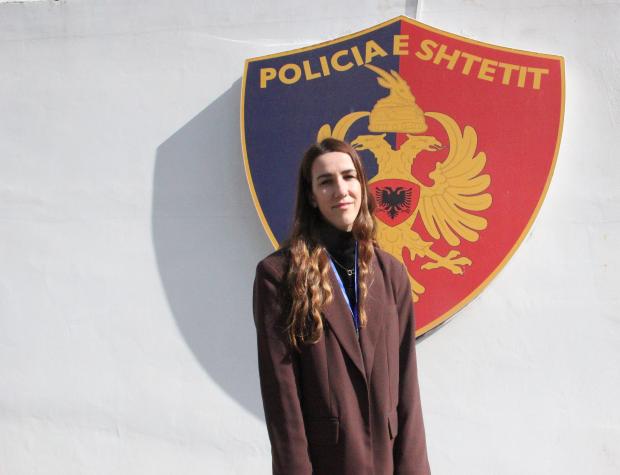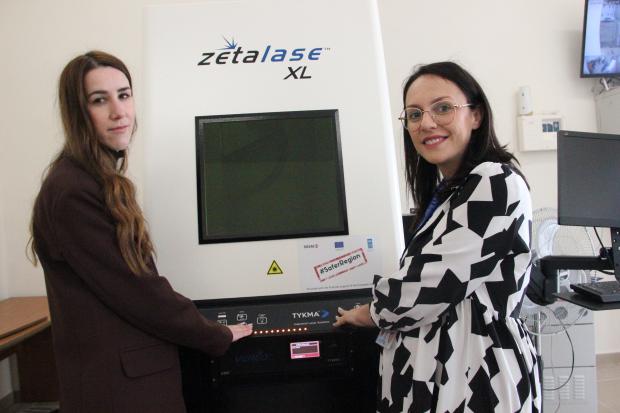Mainstreaming gender in Albanian Police through the OSCE’s SALW project
It is International Women’s Day 2023 — a day to reflect on achievements towards gender mainstreaming and on how cultural norms and social standards support women. Today we are taking a closer look at women police officers, which, in Albania, is often not considered an easy and suitable job for women.
Despite the challenges, there are many courageous women in the Albanian Police who are now playing significant roles and contributing to the security and safety of the country.
Two of these women are Orjola Lika and Vojsava Çopani. They are part of the Albanian State Police administration, and one of their tasks is engaging in the OSCE project, “Assisting the national authorities of the Republic of Albania to decrease the risk of weapon proliferation and misuse of Small Arms and Light Weapons (SALW)”. This project is being carried out by the OSCE Presence in Albania and is part of the Presence’s assistance to the Albanian State Police and the Ministry of Interior.

Perspectives on being a women in the Albanian State Police
Orjola has been in the Albania State Police’s financial department for seven years. She was most recently appointed to the Albanian State Police Deactivation Unit. The Unit, through the Deactivation Centre, handles technical processes including verification, marking, certification and record keeping of firearms to be deactivated. The OSCE’s SALW Project is in the process of refurbishing the Centre by purchasing the necessary equipment to perform deactivation work and to support the Unit’s personnel with becoming certified for deactivation activities.
When she recalls the day she joined the State Police, Orjola’s eyes fill with tears: “I wanted to follow in my father’s footsteps. He was a police officer who lost his life during his service. Growing up with a father who was a police officer, I always dreamed of following his legacy.”
When Vojsava joined the Albanian State Police five years ago, she was a little unsure of her path, despite being an excellent student in the university. She entered in the police force through its excellence programme. She recalls the questions marks in her head during those first days and months at work, wondering if it was the right choice to join the police force, especially with it being a male-dominated environment. “Although women’s roles in the police force have become more widely accepted and recognized, it is still seen as a men-driven job, including by my family and friends. But I believe women have many qualities, such as leadership, management, positive approaches and active engagement, that can help increase the positive impact and perception of the Albanian State Police in communities, while also ensuring the security and safety of its citizens.”
Orjola echoes Vojsava’s perspective: “A lot has been done to increase the number of women in the Police Force, but much more is needed to be done. Not only in terms of statistics, but, more importantly, in terms of enhancing the role of women in key leadership and management positions.”

Why mainstream gender
The Albanian State Police has set a target of 50 per cent women in its recruitment policy and has launched a women recruitment campaign to increase the participation of women and girls in police forces. While this is an important step, there is still much to be achieved in practice.
Some units of the Albanian State Police that are working with the OSCE SALW project, such as the K9 unit and the Deactivation unit, are facing great challenges with gender mainstreaming and incorporating women into their ranks. The OSCE project is now helping them address those challenges.
“We have developed the SALW Project’s Gender Mainstreaming Strategy to directly contribute to gender equality efforts in the context of arms control while also helping beneficiary institutions and ensuring our project activities are proactively addressing gender issues,” says Xhenis Ballço, a national SALW Project Officer in the OSCE Presence in Albania.
Moving down the path of gender mainstreaming
The development of the SALW Project Gender Mainstreaming Strategy was done in consultation and close co-ordination with the relevant national authorities in Albania that handle the control of small arms and light weapons. This includes the Albanian State Police, the SALW commission, the Ministry of Interior and the project working group of the SALW project.
Each activity of the Gender Mainstreaming Strategy is designed to strengthen the capacities of these national authorities to include gender perspectives in their SALW control policies, implementation, and decision making. The Strategy will also ensure that all project activities, such as training courses, standard operating procedures, other plans and documents, and infrastructure reflect gender aspects. Additional recommendations for further gender mainstreaming activities will also be developed and discussed with project partners as part of the Strategy.
“I felt so privileged and encouraged to be engaged in this process of developing the Gender Mainstreaming Strategy,” says Vojsava. “I was able to share my challenges as a woman in the police force, as well as my ideas and my proposals on how our role can be further empowered within police forces and in society.”
Activities organized around the Strategy have been presented to various stakeholders of the Albanian State Police. They have welcomed the findings and expressed their will and availability to further engage with the project and its strategy.
“It is still a little too early to speak about impact, but we are really encouraged by the positive direction we see happening with several units of the police force,” says Xhenis. “We are also very happy to see Orjola being appointed to the Deactivation Unit. She is a great source of administrative support and adds another diverse perspective to the Unit.”
The OSCE SALW project is funded with the support of the European Union, Germany and France.

